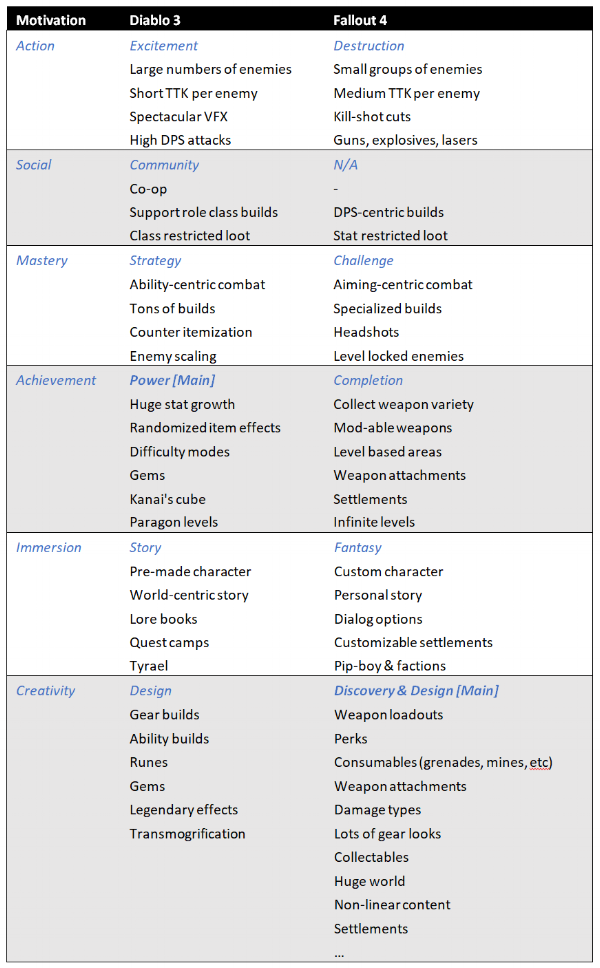The differences in systems between the two games stem from the high-level choices relating to how players are motivated to engage with the games. Both are great games that have diverse players, because they each satisfy all the primary motivators. So, you must examine the secondary motivators. Using the Quantic Foundry player behavior motivation model, you can map each game's secondary motivators out like this:
Of course, this analysis is a bit black and white, as there are definitely shades of grey here. Especially, when analyzing across the achievement and mastery motivations, since both games do rely heavily on feeling power growth and build strategy.
But because each game emphasizes different secondary motivators, you see many of the same systems and loops with significantly different implementations. The below chart lays out a few examples of the differences across all the motivators:
Systems that exemplify the similarities and differences
Stats & Power Growth: The application of stats in each game increases power, but because of Fallout's shooter combat style, they chose to make the amount stats effect the outcome of an encounter far less than Diablo where every fight can be overpowered through gear.
For example, the highest base DPS of a weapon in Fallout 4 is 726, but you still must aim accurately to achieve that DPS. In Diablo 3, I've seen weapons that are 3,000+.
Fallout's stats also increase secondary attributes, increasing their utility value in addition to their power value. For example, strength increases carry weight and melee damage. Whereas, Diablo 3's strength affects 2 combat-only stats, damage and armor for Barbarians and Crusaders.
Leveling: Levels in both games are attained through earning XP. On leveling in Fallout you receive a perk point which is spent in a tree. Each unlock in the tree gives bonuses that tailor your character to a playstyle. Points can be spent in multiple areas to create a character that plays exactly how you prefer.
In Diablo, levels unlock class abilities, passives, and ability runes. These unlock in a predefined order. Because of this the player's agency is centered around which they choose to equip to satisfy the specific role or ability combo/synergy they want to play.
So, in Fallout, I can be a stealthy melee guy or a stealthy ranged guy by swapping my weapon and spending points in perks. In Diablo, I can be a defensive wizard or glass canon wizard, depending on the abilities I've selected.
While both systems award leveling with giving the player more tools to play with, they achieve it in different ways that supports their individual game's needs.
Weapon customization: In both games weapons can be customized. In Diablo, the player equips gems on their weapons or rerolls their stats to generally increase the amount of damage the weapon does, but because weapons do not scale damage to match the challenge being presented that weapon will eventually need to be replaced. Because of this, Diablo avoids any systems that drive attachment to weapons, otherwise they would risk players feeling unsatisfied with the reward loop.
Fallout encourages weapon attachment by allowing players to craft different mods that can be equipped on an item that not only increase DPS but customize the weapon to suit the player's personal playstyle and needs. In a game that requires shooter skill to be successful this is highly important, otherwise a player feels they cannot be successful because the game isn't giving them the option to play how they want.

